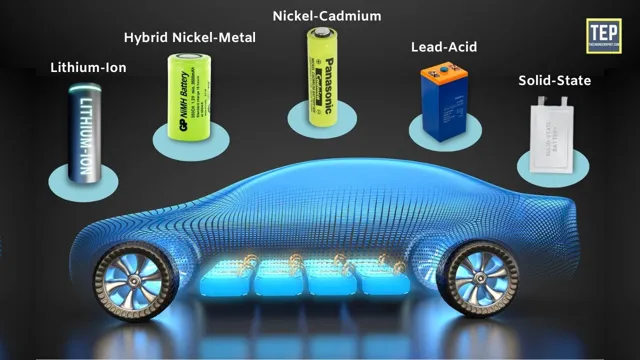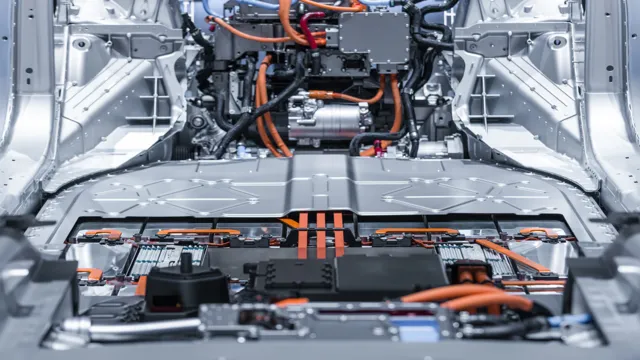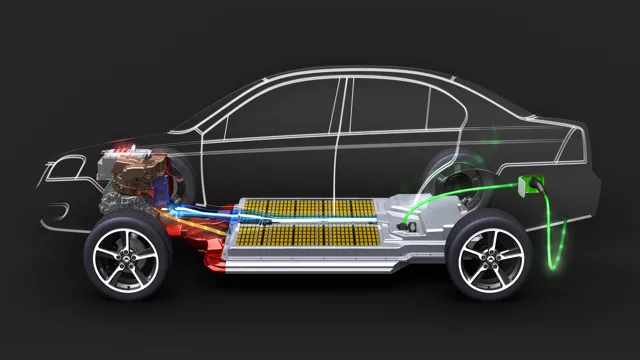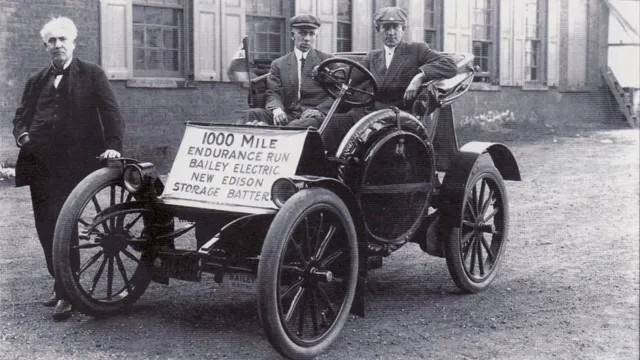Exploring the Truth: Do Electric Car Batteries Contain Acid?
Electric cars are all the rage nowadays, and for good reason too. They are a cleaner alternative to traditional cars, running on electricity instead of finite resources like oil. But with this new technology come new questions, particularly about the batteries that power these vehicles.
One common question is whether electric car batteries are acidic or not. It’s a valid concern, especially considering the impact that acidic substances can have on the environment. Today, we’ll explore this question in detail and provide you with all the information you need to know about electric car batteries.
Explaining Electric Car Batteries
One of the questions people often have about electric car batteries is whether or not they contain acid. The short answer is no. Unlike traditional car batteries, which use lead-acid chemistry, most electric car batteries use lithium-ion technology.
Lithium-ion batteries use a combination of materials like lithium cobalt oxide or lithium iron phosphate to store and release energy. These materials are generally safe and non-toxic, so there is no need for acid. Additionally, lithium-ion batteries are sealed and contain very little liquid, so even if there was acid, it would be contained within the battery and not pose a risk to passengers.
It’s important to note that while electric car batteries don’t have acid, they should still be handled and disposed of properly to prevent environmental damage.
Composition of Batteries
Electric car batteries are complex devices that produce the electrical energy required to power your car. They are made up of several components, each of which is carefully crafted to help the battery function at peak efficiency. The main components of an electric car battery include the cathode, anode, electrolyte, and separator.
The cathode is typically made up of a metal oxide, while the anode is often graphite-based. The electrolyte is a liquid or gel-like substance that serves as a conductor for the electrical charge. Finally, the separator is a thin layer that separates the cathode and anode, preventing them from coming into direct contact with one another.
Together, these components work in harmony to produce the electrical energy required to power modern-day electric vehicles. In summary, electric car batteries are a complex but essential component that powers these cutting-edge vehicles.
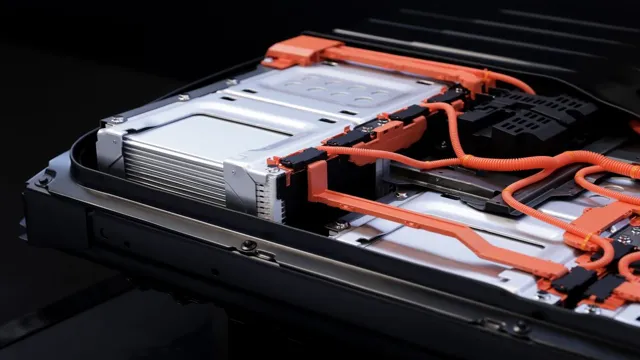
Different Types of Electric Car Batteries
Electric car batteries come in different types, and it’s essential to understand each one to determine which is the best for your vehicle. Lithium-ion batteries are the most popular type of electric car batteries due to their high energy density, which allows the car to travel longer distances on a single charge. However, they are also more expensive than other battery types.
Nickel-metal hydride batteries are another option that was popular before the emergence of lithium-ion batteries. They are still used in some hybrids and electric vehicles due to their lower cost and excellent reliability. Lastly, solid-state batteries are a newer battery technology that aims to improve on lithium-ion batteries’ performance.
These batteries use a solid electrolyte instead of a liquid electrolyte, increasing their energy density and lifespan. Overall, choosing which battery type is best for your electric car depends on your driving habits, budget, and desired performance.
Acidic Batteries vs Lithium-Ion Batteries
Electric car batteries do not typically use acid but rather a lithium-ion battery chemistry. Acidic batteries, such as lead-acid batteries, are commonly used in traditional gasoline-powered vehicles. Lithium-ion batteries are much more efficient and offer a higher energy density than acidic batteries.
They also have a longer lifespan and are more environmentally friendly. While there are discussions about alternative battery chemistries for electric vehicles, currently, most electric cars rely on lithium-ion batteries. In addition to being used in electric cars, they are also used in other electronic devices such as laptops and smartphones.
So, to answer the question, no, electric car batteries do not have acid but instead use a lithium-ion chemistry.
How Acidic Batteries Work
When it comes to batteries, there are two main types: acidic batteries and lithium-ion batteries. Acidic batteries work by harnessing the power of a chemical reaction between an acid and a metal. This reaction produces electrons, which flow through the battery and create electrical energy.
Acidic batteries are found in a variety of devices, from small electronics like calculators and remote controls to larger equipment like forklifts and golf carts. However, the high toxicity of the acids inside these batteries makes them difficult to dispose of properly. Lithium-ion batteries, on the other hand, use lithium ions to store and release energy.
They are much more efficient and environmentally friendly than acidic batteries, which is why they are quickly becoming the go-to choice for many devices. Plus, they can be recharged many times without losing their efficiency, making them a cost-effective and convenient option. Overall, while acidic batteries may be cheaper initially, the advantages of lithium-ion batteries make them a smart choice for efficiency and sustainability.
Pros and Cons of Acidic Batteries
When it comes to batteries, there are various types available in the market. Two of the most popular types of batteries are acidic batteries and lithium-ion batteries. Acidic batteries have been used for a long time in various applications, including automobiles, motorcycles, and boats.
These batteries use lead and acid to produce power. One of the main advantages of acidic batteries is that they are affordable and readily available. However, they have some drawbacks, such as being heavy and requiring maintenance.
In comparison, lithium-ion batteries are newer and more expensive than acidic batteries. However, they offer several advantages, such as being lightweight, having a high energy density, and not requiring maintenance. They are also more environmentally friendly, and they can be used in various applications, such as in electric cars and smartphones.
In conclusion, the choice between acidic batteries and lithium-ion batteries depends on several factors, such as the intended application, cost, and environmental impact. While acidic batteries are still widely used, lithium-ion batteries are becoming more popular due to their many advantages.
How Lithium-Ion Batteries Work
Lithium-ion batteries have become the go-to power source for most modern devices, from cell phones and laptops to electric cars and even airplanes. Unlike traditional acidic batteries that use lead-acid, nickel-cadmium or nickel-metal-hydride technologies, lithium-ion batteries rely on a chemical reaction between lithium ions and a cathode to generate and store energy. The main advantage of lithium-ion batteries over other types of batteries is their high energy density, which means they can store more energy in a smaller space.
This feature is particularly important for portable devices that need to be lightweight and compact. Moreover, unlike acidic batteries that lose charge quickly and have a limited lifespan, lithium-ion batteries can retain their charge for longer, and can be recharged hundreds of times without significant loss of performance. Overall, lithium-ion batteries are a more efficient, reliable and environmentally friendly option for our power-hungry world.
Pros and Cons of Lithium-Ion Batteries
Lithium-Ion Batteries Acidic batteries and lithium-ion batteries are two types of batteries that are commonly in use today. Both have their own sets of pros and cons. On one hand, acidic batteries are cheap, readily available, and can power up small devices like toys and remote controls.
However, they are not very efficient and not as long-lasting as lithium-ion batteries. They also require frequent replacements, which can be a hassle. Lithium-ion batteries, on the other hand, are more expensive, but are worth the investment as they are more efficient and have a longer lifespan.
They can also store more energy and have a higher power output, making them versatile and practical. They are environmentally friendly and are recyclable, which is a plus point for those who seek to be environmentally conscious. However, the downside to lithium-ion batteries is that they can be sensitive to temperature changes, can overheat and catch fire, and are difficult to dispose of.
They also require specialized tools to repair, making them more of a hassle compared to the basic acidic battery. In conclusion, while both types of batteries have their own sets of pros and cons, lithium-ion batteries seem to come out on top in terms of efficiency, lifespan, and environmental impact. However, for small devices that require basic power, acidic batteries may be sufficient.
Ultimately, the choice between the two types of batteries will depend on the user and their specific requirements.
Are Electric Car Batteries Acidic?
One common misconception about electric car batteries is that they contain acid, like traditional lead-acid car batteries. However, electric car batteries are actually made with a different type of chemistry, typically lithium-ion. Lithium-ion batteries use a combination of lithium and other metals, such as cobalt or nickel, to create a chemical reaction that produces energy.
These materials are stored in a non-acidic liquid or gel electrolyte, which helps to facilitate the chemical reaction within the battery. So, no, electric car batteries are not acidic and do not pose the same environmental or safety risks as traditional car batteries.
Why Lithium-Ion Batteries are Chosen Over Acidic Batteries
Electric car batteries are not acidic. In fact, electric cars use lithium-ion batteries instead of the traditional lead-acid batteries used in gas-powered vehicles. Lithium-ion batteries offer several advantages over acidic batteries, making them the preferred choice for electric cars.
Firstly, lithium-ion batteries have a higher energy density, meaning they can store more energy in a smaller package. This makes them lightweight and ideal for electric cars, which need to be as lightweight as possible to maximize their range. Secondly, lithium-ion batteries have a longer lifespan compared to acidic batteries, reducing the need for replacements.
Additionally, they are less toxic and more environmentally friendly than acidic batteries. All these factors make lithium-ion batteries the best choice for electric cars, enabling them to deliver high performance and reliability.
Safety Measures for Electric Car Batteries
Electric Car Batteries Electric car batteries are not acidic. They are made of lithium-ion and do not contain any acid. However, it is important to handle them with care as they can be dangerous if not properly stored or handled.
Safety measures for electric car batteries include wearing protective gear like gloves, goggles, and face shields. The batteries should also be stored in a cool, dry place, away from direct sunlight and heat sources. It is also important to follow the manufacturer’s guidelines for charging and discharging the battery to prevent damage and potential hazards.
Although electric car batteries are not acidic, they can still pose a risk if not handled properly, so it is important to take all necessary precautions to ensure safety.
Conclusion and Final Verdict
In conclusion, asking whether electric car batteries have acid is like asking if strawberries have fish scales. The answer is a resounding no, as electric car batteries are typically made with lithium, not acid. So, if you’re wondering whether you’ll need a HazMat suit to change out your car’s battery, fear not – the only thing you’ll need is a bit of technical know-how.
“
FAQs
What type of batteries do electric cars use?
Electric cars use lithium-ion batteries, which are rechargeable and have high energy density.
Are electric car batteries dangerous?
While lithium-ion batteries can be potentially hazardous if damaged or mishandled, they are generally considered safe for use in electric vehicles.
Do electric car batteries contain acid?
No, electric car batteries do not contain acid. They use a combination of lithium-ion cells and various electrolytes to store and provide energy.
How long do electric car batteries last?
The lifespan of electric car batteries can vary greatly depending on the make and model of the vehicle, as well as factors like usage and maintenance. Generally, they are designed to last for several years or tens of thousands of miles before needing to be replaced.
